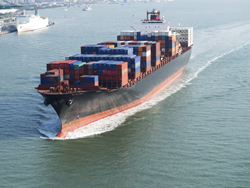Keeping Europe's economy moving
Compared to other modes of transport, shipping has a clear advantage in terms of emissions per tonne nautical mile. However, the amount of trade carried by sea is expected to rise over the coming years. Green house gas emissions from shipping are thus likely to increase if ships are not designed with less resistance, cleaner engines and power production based on alternative fuels.In particular, the design of propellers has changed very little in the past years, although it affects the overall energy efficiency of the vessels. To address these concerns, the 'Strategic research for innovative marine propulsion concepts' (STREAMLINE) has investigated three new, radically different propeller systems.The first relies on the installation of the propeller far behind the ships, so the size of the propeller can be increased dramatically while lowering its speed. The second moves large amounts of water through relatively small changes in velocity, imitating the tail of a whale as it propels itself through water. And the third comprises an array of small propellers, where water coming out of one set of propellers enhances the efficiency of the next set and so on.At the same time, the STREAMLINE team applied computational fluid dynamics tools and theoretical models to achieve higher levels of the efficiency for several currently used propellers. They also searched for ways to boost the efficiency of water jet propulsion. Despite the unparalleled performance at high speeds, a major drawback of waterjets is that for low speeds this propulsion system becomes inefficient as compared to conventional propellers. Extensive tests in the laboratory have shown that power consumption for the new propeller systems can decrease by up to 13.5 %, while the overall efficiency gains can reach 30 %. Once improvements verified in the laboratory move to the commercialisation phase, the STREAMLINE project will have a significant effect on reducing fuel consumption and polluting emissions in the not so distant future.
Keywords
Sea, shipping, green house gas, emissions, fuel consumption, propeller, propulsion, waterjet, CFD



